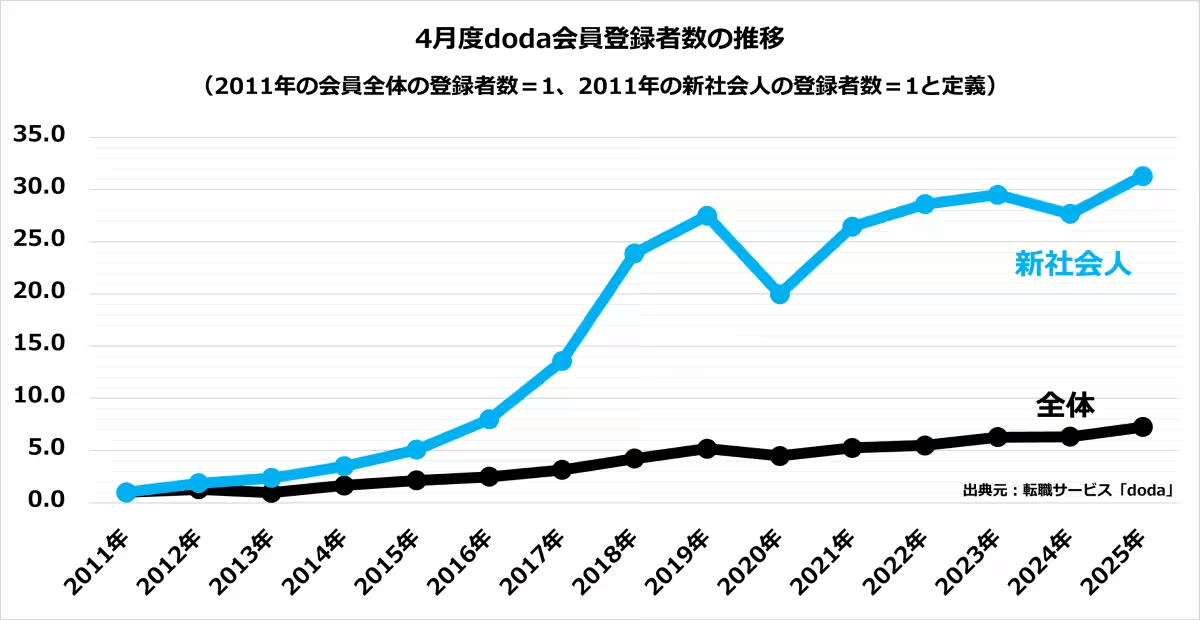

The Job Transition Trends of New Professionals in 2025: Insights and Implications
Job Transition Trends of New Professionals in 2025
The job transition service "doda" operated by Persol Career Co., Ltd, led by editor Takafumi Sakurai, has released the 2025 insights on the registration trends of new professionals. Remarkably, the number of new graduates joining the doda platform in April 2025 has reached an all-time high. This surge is attributed to a variety of factors affecting the perception and approach to career transitions among the emerging workforce.
Significant Surge in Registrations
In April 2025, the number of new professionals registering on doda has increased by 113% compared to the previous year, highlighting a staggering 31-fold increase since the analysis began in 2011. When compared to the figures from 2015, the rise is also notable, demonstrating that more graduates are exploring their job options earlier than ever.
Reasons for Increased Registration
Two primary factors have contributed to the rise in registrations among new professionals:
1. Pursuit of Better Opportunities: Many new graduates are actively seeking work environments that offer favorable compensation and career opportunities. With an employment offer rate for the 2025 graduating class reaching 92.6%, the job market has become increasingly favorable due to a decline in the young workforce’s population. Additionally, reactions to rising living costs and interest rates have led companies to offer substantial salary hikes, with some raising entry-level salaries above 300,000 yen per month. This shift in workplace dynamics has prompted graduates to reconsider their options, aiming for companies that align more closely with their aspirations.
2. Emphasis on Career Mobility: Many new professionals belong to what can be termed the "job transition native generation". This group views career transitions as a necessary and acceptable part of their career path. A recent survey revealed that around 70% of people in their 20s see job transitions as a positive move. Interestingly, they are prioritizing experiences that contribute to their personal growth and the ability to contribute to society over traditional metrics of self-improvement. This shift in focus indicates a cultural change among young professionals, who now consider transition as a viable means of self-realization and professional development.
The Future of New Professionals in the Workforce
As the notion of lifelong employment fades, the current cohort of new graduates is more likely to select their first careers with an eye on future transitions. This emerging mentality encompasses a desire for informed decision-making rather than impulsive career shifts based solely on salary increases. While this trend demonstrates an encouraging development in professional autonomy, it also presents risks if the focus leans too heavily on immediate financial gain over long-term career satisfaction.
Employees are urged to conduct thorough research and maintain perspective as they navigate their career choices in the face of a consistently tight labor market. Firms must adapt to this evolving mindset by providing clear career paths, fair compensation, and roles that allow for individuality and expression.
Challenges Ahead
The future suggests a continued gap in the available workforce, with estimates pointing to a shortfall of 17.75 million hours of labor per day by 2035. Given the projected rise in demand for young talent, the job market for new professionals is expected to remain flexible and favorable for job seekers. Thus, an increasing number of new professionals will likely register with transition services like doda.
In conclusion, 2025 marks a pivotal year that reflects profound changes in how new graduates approach their careers. As these graduates leverage the job market to increase their autonomy, the way organizations respond to these expectations will shape the future landscape of employment in Japan.



Topics Consumer Products & Retail)










【About Using Articles】
You can freely use the title and article content by linking to the page where the article is posted.
※ Images cannot be used.
【About Links】
Links are free to use.